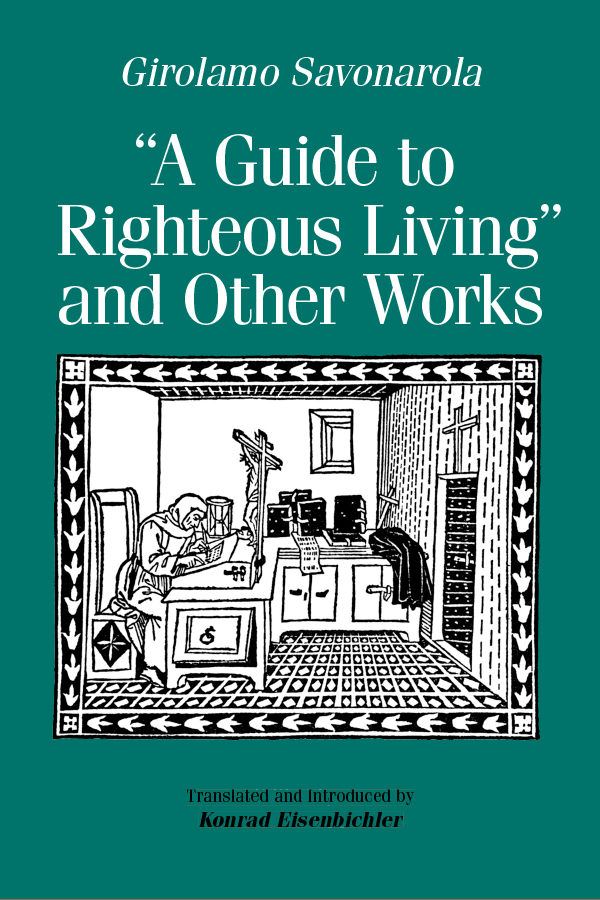A Guide to Righteous Living and Other Works, by Girolamo Savonarola
Translated and introduced by Konrad Eisenbichler - TT10
Overview
On May 23, 1498, Girolamo Savonarola, one of the most spell-binding figures of the Italian Renaissance, was publicly burned at the stake on the main piazza of Florence on trumped-up charges of heresy and sedition. Thus ended the friar’s meteoric rise to power and his unprecedented influence over Florentine society. Though his ashes were unceremoniously dumped into the River Arno the moment the cinders had died away, the fire of his teachings could not be extinguished, nor could Florentines forget the riveting preacher from Ferrara who, in four short years, had turned their city upside down. Neither could Italians nor European reformers, for they soon turned Savonarola into a prophet of renewal and into a symbol of the struggle against corruption. Whether he was one or the other or neither, is still very much under debate.
This collection of texts from Savonarola’s extensive body of works seeks to provide the English reader with a variety of entry points into this controversial figure. With samples from his letters to his poems, from his sermons to his pastoral works, it more than doubles the number of Savonarola’s works currently available in English. In so doing, it makes his teachings that much more accessible to wide range of scholars and students alike.
Translated and introduced by Konrad Eisenbichler.
Professor Konrad Eisenbichler teaches Renaissance Studies and Italian at the University of Toronto. He has published widely on the Italian Renaissance, focusing primarily on the intersection of literature, politics, and religion. His book The Boys of the Archangel Raphael: A Youth Confraternity in Florence, 1411-1785 (Toronto, 1998) was awarded the Howard R. Marraro Prize from the American Catholic Historical Association. Professor Eisenbichler has been a two-term Director of the Centre for Reformation and Renaissance Studies and President of the Sixteenth Century Studies Conference. He is currently President of the Canadian Society for Renaissance Studies and Editor of the journal Quaderni d’italianistica.
250 pp.
ISBN: 978-0-7727-2020-7 softcover
Published: 2010
Reviews
“Eisenbichler has chosen a variety of [Savonarola’s] writings hitherto unavailable to English scholars […] personal letters, religious poems, sermons and pastoral works, all of which help to reveal Savonarola as a complex but compassionate and very human figure.” — Mary Hewlett, Renaissance and Reformation/Renaissance et Reformé 27/3 (2003), p. 114.
Contents
Letters:
- To his father explaining why he became a friar (25 Apr. 1476)
- To his mother explaining that a prophet is not listened to in his own country (25 Jan. 1490)
- To Elena Savonarola consoling her on the death of her brother Borso (5 Dec. 1485)
- To Giovanna Carafa Pico, congratulating her for wishing to die rather than sin (15 Dec. 1495)
- To Beatrice Savonarola with a copy of his lauda for St Mary Magdalene (3 Nov. 1496)
- To Giovanna Carafa Pico and Eleonora Pico della Mirandola telling them not to worry about venial sins (3 Apr. 1497)
- To Polissena Petrati and Lucrezia de’ Rana (?) congratulating them on entering a convent (24 May 1497)
- To Angela Sforza d’Este encouraging her to listen to God’s call (24 May 1497)
- To Caterina Sforza, duchess of Imola and Forlì, in answer to her request for advice (18 June 1497)
- To Giovanna Carafa Pico saying tribulations merely prepare the way to heaven (13 Aug. 1497)
- To the nuns of Annalena instructing them on how to read sacred texts (17 Oct. 1497)
- To Giovanna Carafa Pico advising her to set aside scruples of conscience and live more cheerfully (6 Nov. 1497)
Poems
Canzone I. On the Ruin of the World
Canzone II. On the Ruin of the Church
Canzone III. Song to St Catherine of Bologna
Sonnet I. On the Lord’s Ascension
Sonnet II. On the Assumption of the Virgin Mary
Sonnet III. To the Virgin
Lauda I. Omnipotent God
Lauda II. Song of Praise to the Crucifix
Lauda III. My heart, why do you stay here?
Sermons
On Haggai, Sermon No. 1 (1 Nov. 1494) `Do penance’
On the Psalms, Sermon No. 3 (13 Jan. 1495) `Behold the sword of the Lord’
On Ruth and Micah, Sermon 28 (2 Nov. 1496) `On the Art of Dying Well’
On Exodus, Sermon No. 1 (11 Feb. 1497) `Renovation Sermon’
Pastoral Works
Ten Rules to Observe in Time of Great Tribulations
On the Prudent and Judicious Way of Living in the Order
A Guide to Righteous Living
The Book on the Life of the Widow
Exposition on the Prayer to the Virgin
Couldn't load pickup availability


